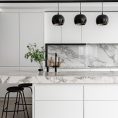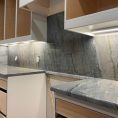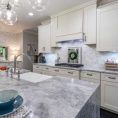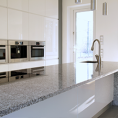Designing a Chef’s Kitchen: The Best Countertops for Cooking Enthusiasts
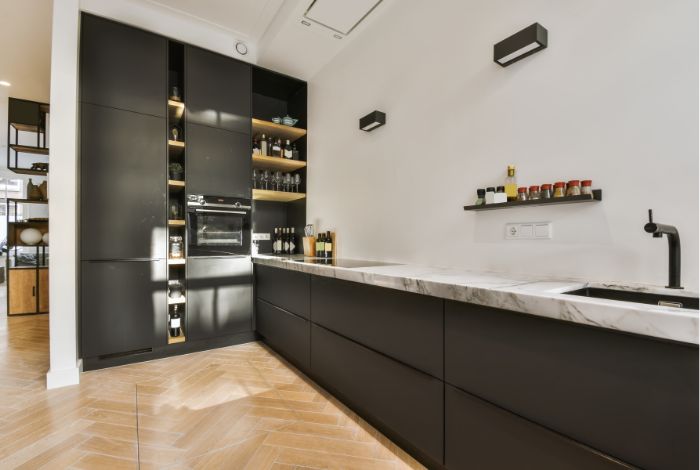
Designing a chef’s kitchen requires careful consideration of both functionality and style, with countertops playing a crucial role. For cooking enthusiasts, countertops need to withstand heavy use, resist stains, heat, and scratches, and provide ample workspace for food preparation. Materials like quartz, dolomite, granite, quartzite, marble, and porcelain offer the perfect blend of durability, aesthetics, and practicality for a high-performance kitchen. In this article, we’ll explore the best countertop options for creating a chef’s kitchen that’s both beautiful and built to handle the demands of passionate home cooks.
Quartz Countertops
- Durable and Non-Porous: Quartz is an engineered stone that is non-porous and highly resistant to stains, scratches, and heat. This makes it ideal for a chef’s kitchen, where spills and hot cookware are common.
- Low Maintenance: Quartz countertops are easy to clean and require no sealing, providing a hygienic surface that resists bacteria and mold growth. This makes quartz a perfect choice for cooking enthusiasts who need a low-maintenance, high-performance countertop.
- Variety of Designs: Available in a wide range of colors and patterns, quartz can mimic the look of natural stone while providing a sleek, modern appearance that complements any kitchen design.
Dolomite Countertops
- Elegance and Durability: Dolomite offers the elegant look of marble with increased durability, making it resistant to heat and scratches. This balance of beauty and strength makes dolomite an excellent option for chefs who want a stylish yet practical kitchen.
- Smooth Surface for Prep Work: Dolomite’s smooth surface is ideal for rolling out dough and other food preparation tasks, providing a functional workspace that also enhances the kitchen’s aesthetics.
- Maintenance Considerations: While dolomite requires regular sealing to maintain its resistance to stains, its durability and sophisticated appearance make it a favorite for those seeking a high-end look with practical benefits.
Granite Countertops
- Natural Strength and Heat Resistance: Granite is known for its durability and ability to withstand high heat, making it ideal for a chef’s kitchen. You can place hot pots and pans directly on the surface without fear of damage.
- Scratch and Stain Resistant: With proper sealing, granite is resistant to scratches and stains, ensuring it remains in excellent condition even after heavy use in a busy kitchen.
- Unique Patterns and Colors: Granite’s natural patterns and rich color variations can add visual interest to your kitchen, making it both a functional and aesthetically pleasing choice.
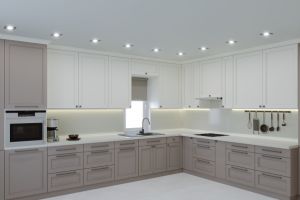
For cooking enthusiasts, countertops need to withstand heavy use, resist stains, heat, and scratches, and provide ample works
Quartzite Countertops
- Luxurious and Hard-Wearing: Quartzite offers the luxurious appearance of marble with the added durability of granite. Its resistance to heat, scratches, and etching makes it an excellent choice for chefs who need a robust and beautiful countertop.
- Ideal for High-Use Kitchens: Quartzite’s hardness ensures it can handle the demands of frequent chopping, slicing, and other food prep activities without showing signs of wear.
- Natural Elegance: The elegant veining and color variations in quartzite add a touch of luxury to your kitchen while providing a durable surface that stands up to daily cooking activities.
Marble Countertops
- Timeless Elegance with a Cool Surface: Marble is a classic choice for chefs who love baking, as its naturally cool surface is ideal for rolling out dough and working with delicate pastries. Its timeless beauty adds a luxurious touch to any kitchen.
- Ideal for Specialized Prep Areas: While marble is softer and more prone to scratches and stains, it can be an excellent choice for specialized areas in a chef’s kitchen, such as a baking station.
- Maintenance Considerations: Marble requires regular sealing and careful maintenance to prevent etching and staining. For chefs willing to invest in its upkeep, marble offers a beautiful and functional work surface.
Porcelain Countertops
- Highly Durable and Heat Resistant: Porcelain is extremely resistant to heat, scratches, and stains, making it an ideal choice for a chef’s kitchen. You can place hot pans directly on the surface without worrying about damage.
- Non-Porous and Hygienic: Porcelain’s non-porous surface resists bacteria, mold, and mildew, providing a hygienic workspace that’s easy to clean—an essential feature for any cooking enthusiast.
- Versatile Design Options: Porcelain is available in various colors, patterns, and finishes, including designs that mimic natural stone. Its thin profile and sleek appearance fit well in modern kitchen designs while offering top-tier functionality.
Conclusion
When designing a chef’s kitchen, selecting the right countertop material is essential for creating a workspace that is both functional and stylish. Materials like quartz, dolomite, granite, quartzite, marble, and porcelain offer a range of options that cater to the demands of cooking enthusiasts. By choosing countertops that are durable, heat-resistant, and easy to maintain, you can create a kitchen that supports your culinary passion while adding elegance and character to your home.

